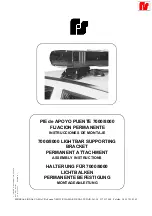
2
m
(Two-Wheel Drive High):
This setting is used for
driving in most street and highway situations. The front
axle is not engaged in two-wheel drive. This setting also
provides the best fuel economy.
AUTO (Automatic Four-Wheel Drive) :
This setting is
ideal for use when road surface traction conditions are
variable. When driving your vehicle in AUTO, the front
axle is engaged, but the vehicle's power is primarily
sent to the rear wheels. When the vehicle's software
determines a need for more traction, the system will
transfer more power to the front wheels. Driving in this
mode results in slightly lower fuel economy than
Two-Wheel Drive High.
4
m
(Four-Wheel Drive High):
Use the four-wheel high
position when you need extra traction, such as on
snowy or icy roads or in most off-road situations. This
setting also engages the front axle to help drive the
vehicle. This is the best setting to use when
plowing snow.
4
n
(Four-Wheel Drive Low) :
This setting also
engages the front axle and delivers extra torque. You
may never need this setting. It sends maximum power
to all four wheels. You might choose Four-Wheel Drive
Low if you are driving off-road in deep sand, deep mud,
deep snow, and while climbing or descending steep
hills.
The vehicle has StabiliTrak
®
. Shifting into
Four-Wheel-Drive Low will turn Traction Control and
StabiliTrak
®
off. See StabiliTrak
®
System in the index of
the Owner Manual for more information.
{
WARNING:
Shifting the transfer case to N (Neutral) can cause
the vehicle to roll even if the transmission is in
P (Park). You or someone else could be seriously
injured. Be sure to set the parking brake before
placing the transfer case in N (Neutral). See
Parking Brake in the index of the Owner Manual
for more information.
N (Neutral) :
Shift the vehicle's transfer case to
N (Neutral) only when towing the vehicle. See
Recreational Vehicle Towing or Towing Your Vehicle in
the index of the Owner Manual.
If the SERVICE 4 WHEEL DRIVE message stays on,
you should take the vehicle to your dealer/retailer for
service. See
DIC Warnings and Messages on
page 4
‑
7
for more information.
3-10
Summary of Contents for 2010 Escalade Hybrid
Page 4: ...2 NOTES iv...
Page 30: ...2 NOTES 3 18...
Page 40: ...2 NOTES 4 10...
Page 50: ...2 NOTES 5 10...
Page 54: ...Engine Compartment Overview When you open the hood on your vehicle you will see 6 4...
Page 106: ...2 NOTES 6 56...
















































